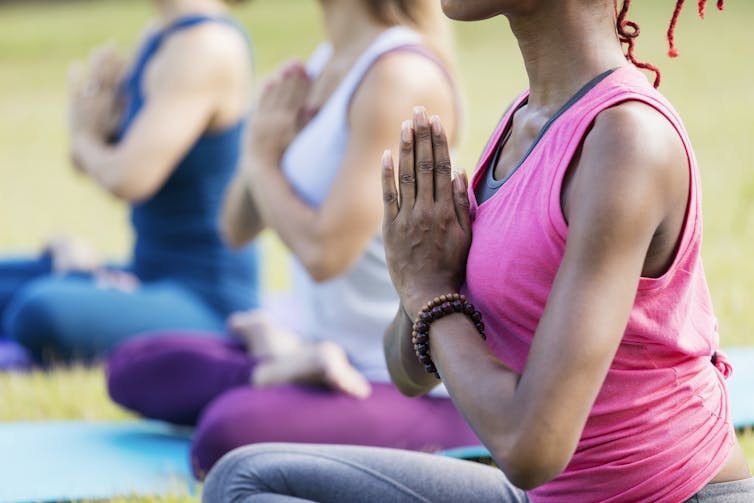25-year-long study of Black women links frequent use of lye-based hair relaxers to a higher risk of breast cancer
- Written by Kimberly Bertrand, Assistant Professor of Medicine, Boston University
The Research Brief[1] is a short take about interesting academic work.
The big idea
Frequent and long-term use of lye-based hair straightening products, or relaxers, may increase the risk of breast cancer among Black women, compared with more moderate use.
Boston University’s Black Women’s Health Study[2] followed 59,000 self-identified African American women for over 25 years, sending questionnaires every two years on new diagnoses and factors that might influence their health.
Using these data in our own study[3], my team of epidemiologists and I[4] found that Black women who used hair products containing lye[5] at least seven times a year for 15 or more years had an approximately 30% increased risk[6] of estrogen receptor positive[7] breast cancer compared with more infrequent users.
The minimal association between hair relaxers (with or without lye) and breast cancer risk for moderate users is generally reassuring. But the elevated risk for the heaviest users of lye-based hair products – which included about 20% of study participants – is concerning.
Why it matters
There is an urgent need to address racial disparities in breast cancer.
Black women diagnosed with breast cancer are 40% more likely to die[8] from the disease than white women. While systemic factors such as delays in diagnosis[9] and poorer health care[10] likely contribute to this disparity, they don’t seem to fully explain the survival gap between Black and white women.
 Black and white women have the same lifetime risk for breast cancer, but Black women are often diagnosed with more aggressive forms earlier in life.
kali9/E+ via Getty Images[11]
Black and white women have the same lifetime risk for breast cancer, but Black women are often diagnosed with more aggressive forms earlier in life.
kali9/E+ via Getty Images[11]
Black women are more likely than white women to develop highly aggressive breast cancers[12] that have higher mortality rates, but researchers don’t really know why. However, scientists do know that chemical hair relaxers[13], more often used by Black women, contain potentially harmful[14] chemicals[15], including possible carcinogens and chemicals known as endocrine disrupters[16], which can interfere with hormone function and could raise breast cancer risk. In the Black Women’s Health Study, 95% of women[17] reported past or current use of these products.
This study fills a knowledge gap on the potential health effects of a consumer product popular among Black women. Given these findings, women may want to be cautious about the types of personal-care products they choose.
What still isn’t known
Because the Black Women’s Health Study did not have information on specific brands of hair relaxers, my team and I could not determine which specific ingredients might be most relevant for breast cancer risk. In addition, because we asked about hair relaxer use before 1997, the results of this study may not apply to products on the market today.
Though our findings suggest a link between the use of certain types of hair relaxers and breast cancer, epidemiologic studies such as this one cannot definitively prove that hair relaxers cause breast cancer. Additional research is needed, especially on currently available products.
What other research is being done
Evidence from animal[18] and other experimental studies[19] support a possible link between chemicals included in hair relaxers and cancer development. Studies[20] on hair relaxer use[21] and breast cancer risk[22] in people, however, have had inconsistent results, possibly because of differences in the types of products used or asked about.
What’s next
Thanks to 59,000 study participants in the Black Women’s Health Study, our research team continues to investigate risk factors for breast cancer and other diseases in Black women. By understanding what causes disease and learning about ways to lower risk, society can move one step closer toward eliminating health disparities.
[Like what you’ve read? Want more? Sign up for The Conversation’s daily newsletter[23].]
References
- ^ Research Brief (theconversation.com)
- ^ Black Women’s Health Study (www.bu.edu)
- ^ our own study (doi.org)
- ^ my team of epidemiologists and I (www.bumc.bu.edu)
- ^ hair products containing lye (www.cdc.gov)
- ^ 30% increased risk (doi.org)
- ^ estrogen receptor positive (www.cancer.org)
- ^ 40% more likely to die (doi.org)
- ^ delays in diagnosis (doi.org)
- ^ poorer health care (doi.org)
- ^ kali9/E+ via Getty Images (www.gettyimages.com)
- ^ highly aggressive breast cancers (doi.org)
- ^ chemical hair relaxers (doi.org)
- ^ potentially harmful (doi.org)
- ^ chemicals (www.fda.gov)
- ^ endocrine disrupters (www.niehs.nih.gov)
- ^ 95% of women (doi.org)
- ^ Evidence from animal (doi.org)
- ^ experimental studies (doi.org)
- ^ Studies (doi.org)
- ^ hair relaxer use (doi.org)
- ^ breast cancer risk (doi.org)
- ^ Sign up for The Conversation’s daily newsletter (theconversation.com)

















